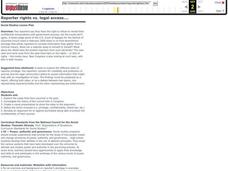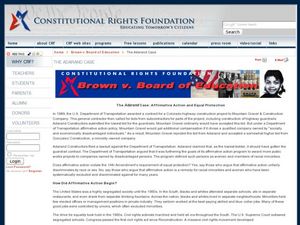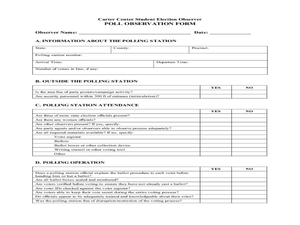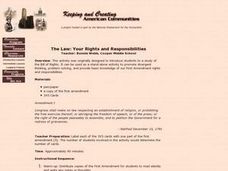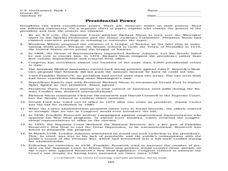Curated OER
The United States Enters the Korean Conflict
Students locate the Korean Peninsula on a world map. They, in groups, study different sources, which explain why the U.S. entered the Korean conflict. One group uses textbooks, the other uses a government document.
Curated OER
Making Vaccines
Students discuss the steps the American government has taken in order to protect every U.S. citizen from a bioterrorist attack and how a vaccine works. After discussion, students can create six vaccines in their own virtual laboratory.
Foreign Policy Research Institute
Understanding China: The Prospects for Democracy in China
This document provides useful information for a unit on democracy in China. While it does not include detailed activities, it does have a list of democratic principles, and important facts about China that facilitate understanding of its...
Curated OER
Reporter Rights vs. Legal Access...
High schoolers explore cases that have occurred in the past in which reporters refuse to reveal their confidential conversations with government sources and investigate the status of the current bills in Congress. Students use this...
Curated OER
Putin: 'No way back' from democracy
Imagine a meeting between President Bush and Putin. Get your class thinking about global awareness, democracy, and totalitarian modes of government. They examine how two leaders approach major governmental issues and run their countries...
Curated OER
Political Issues and Opinions
The emergent adults in your US Government class can become informed, self-aware voters. This activity enables them to form an opinion about particular political issues then identify themselves on the political spectrum. Informed and...
Curated OER
The Adarand Case: Affirmative Action and Equal Protection
Eleventh graders examine the Adarand case. In this American Government lesson, 11th graders create a list of reasons for each affirmative action program. Students develop a defense on certain issues and present it to the class.
Curated OER
How Does My Government Grow?
Students identify the core democratic values. They explain how the values affect their life in America. They also relate the topic of philantrophy to the core values.
Curated OER
Successful Deaf Leaders in Government
Students create a "Who's Who" compilation of local, state, national and international leaders that advocate, introduce legislation, and lobby for the deaf. They use internet research to create a catalog of biographies and then conduct a...
Curated OER
Observing Elections Around the World
Learners examine elections in countries around the world. In this elections lesson, students watch a video segment regarding election observations and then access selected websites to research specified elections. Learners prepare...
Curated OER
The Law: Your Rights and Responsibilities
Students explore First Amendment rights and responsibilities.
Curated OER
An Early Threat of Secession: The Missouri Compromise of 1820 and the Nullification Crisis
Students analyze an interactive map of the Missouri Compromise to identify the regions and their relation to slavery. In this pre-civil war era lesson, students read primary source documents and research online to answer questions...
Curated OER
Checks on Presidential Power
Students examine presidential powers. In this checks and balances lesson, students identify the constitutional and informal restraints of the president and consider the reasons for the limitations.
Curated OER
The President and the Press ~ FDR's First Press Conference: March 1933
Students consider that many presidential aides now speak "off the record," in essence conveying a message from the president. They examine why most Presidents have fewer press conferences the deeper they get into their terms of office.
Curated OER
Bill of Rights and Lawmaking
Ninth graders consider how the Bill of Rights impacts the lawmaking process in the United States. In this Bill of Rights lesson, 9th graders discuss the amendments and their limitations. Students research the role of the Legislative...
Curated OER
The Myth of Voluntary Internment
Students review the Alien Enemies Act and Executive Order 9095. They explore both the financial and emotional ramifications of having a parent arrested or interned. They research what daily life was like in U.S. Internment camps during...
Curated OER
WWII and the Atomic Bomb
Students explore three decisions about the atomic bomb faced by the U.S. during WWII, take a position on each of the decisions, and defend their position. Should a bomb have been built, dropped, and was the right decision made?
Curated OER
The Invasion of Iraq
Students explore the war in Iraq. They use videos, newspapers, and other media to examine the circumstances leading up to the invasion, the war's major battles, and the post-war situation on the ground. Students read letters from Iraq...
Curated OER
Overcoming Censorship Through Art
High schoolers examine and discuss government-imposed censorship of art and artists' methods for counteracting censorship. They view censored artwork, write a persuasive essay, and create an art piece.
Curated OER
Charter Schools: Can They Survive in Utah?
Young scholars discuss the challenges charter schools face in receiving similar funding as districts. They explore possible policy solutions to the problems faced by Utah's charter schools. They Investigate how government services affect...
Curated OER
Dorothea Lange and the Relocation of Japanese Americans
Students consider the relocation of Japanese Americans during World War II. In this Japanese relocation lesson plan, students examine photographs by Dorothea Lange, the "Pledge of Allegiance," and a US government flyer from 1942. They...
Curated OER
Paying for Crime
Students participate in activties examining ratios and proportions. They use graphs to interpret data showing the government's budget for prisons. They present what they have learned to the class.
Curated OER
Market Structure and Competition
Learners explore the role of government in the economy market. In this economics lesson, students analyze the decision making and how it takes into consideration additional cost, benefits and public awareness of what they are trying to...
Curated OER
By Any Other Name
Students examine the differences between the definitions of race and ethnicity defined by the United States government. After reading an article, they discuss the possiblity of the elimination of some races from the 2010 census. They...
Other popular searches
- U.s. Government Flow Chart
- Ancient Rome u.s. Government
- Ap u.s. Government
- Branches of u.s. Government
- U.s. Government Lesson Plans
- U.s. Government (Branches)
- Cuba and u.s. Government
- U.s. Government Policies
- Early u.s. Government
- U.s. Government History
- Government u.s. Constitution
- Ap u.s. Government Media





